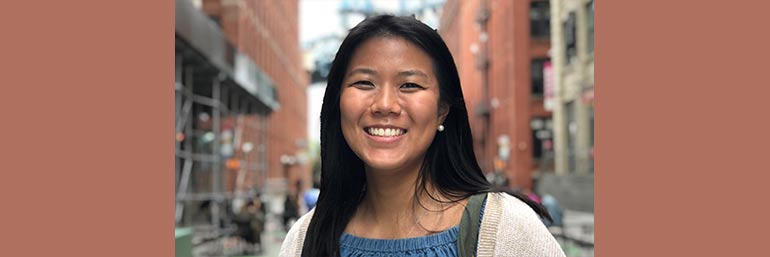Feb 22

NEOMED Alumna Guest-Edits AMA Journal of Ethics
Not even a year after graduating, Katherine Wu, M.D. (’21), M.A., is making a mark.
A preliminary internal medicine resident at OhioHealth Riverside Methodist Hospital in Columbus, she recently received a pre-Match offer to start as a second-year psychiatry resident at the University of Virginia — an offer she gladly accepted.
And the AMA Journal of Ethics issue on Tactical Health and Law Enforcement, which she guest-edited, is now published. Dr. Wu contributed an editor’s note, “Public Health Calls for Changes in Police Practices,” to the February issue. Among the articles is one titled “Crisis Intervention Team Program Leadership Must Include Psychiatrists,” co-authored by two people with NEOMED affiliations: Mark Munetz, M.D., emeritus professor of the Department of Psychiatry, and Natalie Bonfine, Ph.D., an associate professor in the Department of Psychiatry.
Dr. Wu graduated from NEOMED with not only a medical degree but also a master’s degree in medical ethics and humanities from the College of Graduate Studies – a program directed by Julie Aultman, Ph.D., vice dean of the College of Graduate Studies. Read on for Dr. Wu’s comments on finding her career path and more.
Dr. Wu writes:
I was thinking about taking an extra year of medical school to do research, and Dr. Aultman referred me to do an internship, but that didn’t pan out, unfortunately. They didn’t have any open positions at that time. Later, the managing editor of the AMA Journal of Ethics approached me with the guest editorship as an alternative opportunity, and I accepted! Dr. Aultman and I helped to describe the purview of the issue, and we started from there.
Guest-editing the AMA Journal of Ethics
This guest editorship entailed doing an initial literature review, thinking of cases with ethical dilemmas and other editorial questions for authors to answer, and then choosing authors based on their published works and expertise. There is a lot of putting yourself out there with asking authors via email and other means, but I think all networking is like that to some degree.
When I first started thinking about this topic, I was hearing a lot in the news about “defunding the police” and the unfortunate crimes against Black civilians. I was thinking about what physicians could do to alleviate the suffering of affected communities. Occupational health is something that deserves more attention in that respect. How are physicians helping tactical personnel and police officers be well so that they can protect others well?
Crisis intervention teams
Then, I thought about all the other ways that tactical personnel and police influence the health of others. NEOMED does a lot of work and research in crisis intervention teams. A crisis intervention team is a specialized group of officers with mental health de-escalation training who go out into the community and assist in bringing civilians with behavioral crises into the hospital. These civilians otherwise end up in the carceral system when police officers lack the training to identify behavioral health crises.
Coping with the pandemic
COVID-19 has presented numerous challenges—difficulties getting to know my residency cohort and filling up the hospital beds with really sick COVID-19 patients. I still try to have small gatherings now and then to combat the isolation while minimizing risk. There is not much I can do about the number of COVID-19 patients arriving to the hospital, but there is some comfort in commiserating with people who understand the situation.

